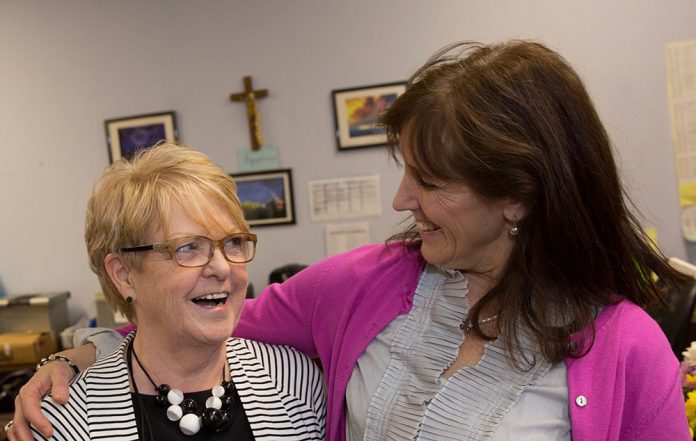
by Kate Ristow
For a form that CREs can use to solicit different kinds of feedback information, see the end of this article.
In recent years, many professionally trained catechetical leaders who are most often known as Directors of Religious Education (DREs) have been replaced by parish Coordinators of Religious Education (CREs). There are a variety of reasons for this shift. Among them are parish budgetary considerations; the desire of the pastor and catechists to have “one of their own” facilitating parish programs; decreased vocations to religious life; and the shrinking pool of individuals with advanced credentials in religious education, religious studies, or other related disciplines. Others have referred to this situation as the “graying” of catechetical leadership. The population of what we have come to think of as “traditional” DREs is aging; many are nearing or well-passed retirement age.
The purpose of this article is not to bemoan change. The Venerable John Henry Cardinal Newman once said, “To live is to change, and to be perfect is to have changed often.” Perhaps the Holy Spirit is guiding us to a new era in catechetical ministry.
As I travel around the country and connect with parish leaders of religious education, I meet more and more CREs. I am struck by their desire for excellence. They want to run effective and professional programs. I also am aware of countless Diocesan Directors proactively addressing this issue by reaching out to CREs to offer support and training, ensuring that catechetical standards continue to represent the best of our tradition.
Let’s take a look at the ministry of the CRE and explore how we can help, sustain, and encourage today’s parish coordinators.
On the Front Lines
To learn more about the work of CREs and how some diocesan staff members are responding to their needs, I conducted e-mail interviews. I asked the following CREs to respond to the interview questions: Mrs. Andy Dougherty, St. Genevieve Parish, Flourtown, PA; Sue Carter, St. Christina Parish, Chicago, IL; Amanda Hoeke, St. Charles Borromeo Parish, Gretna, NE; and Janis Agresta, St. Catherine of Bologna Parish, Ringwood, NJ.
Three of these catechetical leaders identify themselves as Coordinators of Religious Education. Two are recognized as DREs within their parish communities, although they lack what some might consider “traditional” credentials; both of these individuals began as volunteers in religious education or some other ministry, gradually growing into their present roles. All are serious about the importance of their ongoing formation; some have completed or are currently participating in programs at local Catholic colleges that offer certificates in religious education; all take advantage of formation opportunities offered by their diocesan office.
I also e-interviewed five Diocesan Directors: Miss Barbara Amabile, Assistant Superintendent for Religious Education, Diocese of Allentown, PA; Mary Helen Llañez, Coordinator, Office of Elementary Catechesis, Las Cruces, NM; Ms. Christine (Chris) M. Malmevik, Associate Director of Catechesis, Diocese of Springfield, IL; Kathy Schoen, Director of Elementary Religious Education, Archdiocese of St. Louis, MO; and Maria (Maruja) H. Sedano, Archdiocesan Director, Office for Catechesis and Youth Ministry, Chicago, IL.
As this article unfolds, you will note how committed these diocesan leaders are to supporting CREs in various ways. Each sees formation as key to that process.
Maruja Sedano said that we need to “move from the emphasis on the ‘professional’…to the emphasis on ‘vocation to ministry,’ the ‘call to service,’ and the ‘call to be prepared for that ministry.’ Our job is to help train and mentor the new leaders for the parishes.” Chris Malmevik highlighted the opportunities presented by an existing diocesan program called Lay Ministry Formation, “a two-year process which includes a theological foundation year and a specialization year.” Chris recommends that new CREs take the Catechetical Leadership Specialization training, which she often teaches. She emphasizes that during this year, CREs “learn the skills needed to do their ministries.”
Among the many training opportunities offered in Allentown, Barbara Amabile highlights the orientation day she conducts each year in August for new CREs. Barbara reports that the day is divided into sections and that “seasoned” DREs work with her to present the different segments. The day deals with the practical issues new CREs face. Barbara identifies “registration, (recruiting) volunteers, discipline, safe environment standards and norms, Sacrament record keeping, and curriculum” as possible topics.
Kathy Schoen and her staff conduct a similar day in St. Louis. In the morning all new DREs/CREs join with new school principals for orientation “centered around the philosophy and goals of our Catholic educational mission. Simply stated, it’s all about coming into intimacy and communion with Jesus and his Church—the New Evangelization.” In the afternoon the new DREs/CREs meet by themselves and the staff shares “religious education policies, resources, and ‘nitty-gritty’ administrative details.”
In addition to an initial “formation and information” meeting, Mary Helen Llañez emphasizes that “continuous formation is important, but it must be administered at levels that are comprehended by the individual. This office and its resources are here to assist them.” Maruja called attention to the Archdiocese of Chicago’s focus on ongoing formation and explained that all catechetical leaders are “engaged in some type of professional development geared to archdiocesan certification.” Catechetical leaders meet with a Vicariate Coordinator and the Coordinator of Formation and Certification to “work on a personalized ministerial development plan.” From diocese to diocese, a willingness to serve and form all those who work in catechetical ministry is alive and active.
Networks of Support
CREs feel uplifted and supported by the efforts of diocesan staff. Amanda Hoeke mentioned the initial “training course, prompt responses to all (my) questions, and great workshops.” Andy Dougherty expressed gratitude for the “support and guidance” of diocesan personnel and called special attention to the one-on-one parish visits conducted by the Director of Parish Religious Education. Janis Agresta praised the regular meetings with guest speakers addressing topics of interest and spoke of the meaningfulness of days of reflection offered by the Catechetical Leaders Association.
Another important element of formation for each of these CREs is their interaction with other catechetical leaders in their cluster, vicariate, or diocese. Sue Carter said, “They are my support and confidants. We bounce ideas off one another and discuss the different challenges we face.” Janis reports that she “looks to my fellow DREs for sound advice. They offer incredible spiritual, emotional, and practical support.”
Amanda listed four ways other catechetical leaders help her: “They share successful projects that have worked for them so that I don’t have to reinvent the wheel. They answer my questions. They always give me positive support and they are willing to share ideas.” It’s clear from these and other comments from the CREs I spoke with that they are both nourished and nurtured at the local and diocesan level.
Advice for Parish Coordinators
I asked the Diocesan Directors what they would emphasize about the catechetical ministry if they had the opportunity to speak with a new CRE one on one. Their advice speaks to all catechetical leaders.
Kathy Schoen reminds us: “You have been called—chosen by God—for this ministry. It is God’s work—let him use you and he will perform wonders.”
Mary Helen Llañez and Barbara Amabile also emphasized the importance of personal spirituality. Mary Helen said, “We live our ministry 24/7; we do not leave our faith at the door when we go home…the Holy Spirit must be your constant companion.” Barbara asks CREs to “pray always. All the book knowledge in the world cannot bring one close to the heart of Jesus—not without (a) spirituality of the heart. Love his people as he loved them.”
Chris Malmevik cautioned CREs not to become isolated: “There are wonderful catechetical resources and people who can journey with you in your ministry. Seek them out!”
Maruja Sedano urged all those involved in catechesis to look to the future: “The present professional DRE pool around the country has aged and is of retirement age, but still holding positions in parishes, many because of financial need. New talent is not being promoted. Look for young people who have the talent and invite them to ‘taste’ ministry. We need to be more proactive in recruiting for the ‘ministry’ and change the talk about a ‘career in ministry’ to a ‘vocation and response to the call to discipleship.’ Young people will rise to the challenge of discipleship as we did when we were young. But we also have to be ready to let go and open the road for the new generation to take over.”
Today and Tomorrow
I asked each of our CREs to share the challenges they face and their hopes for the future. Their responses are revealing of their commitment to ministry.
Sue Carter declared: “I want this to be the best program; I want to have planted 420 seeds (one for each of her 420 students) through my catechists and myself.” Sue wants school and parish catechists to form a “bridge to work together” and she looks to a “future of becoming one with Christ.”
Janis Agresta hopes to overcome the tendency of families to drop out of programs after First Communion only to return in time for Confirmation. Her desire is to do this without using “gimmicks to get them to come, but by communicating the truths and beauty of our Catholic faith.”
Although Amanda Hoeke is sometimes overwhelmed by the feeling that there is so much to know and do, her dream is that each “child will experience an intimate relationship with God” and that she and her staff are able to help the children “to fulfill God’s plan for them.” Her optimism shined through when she wrote, “I pray that they will understand that learning about their faith is fun and rewarding!”
More than anything, Andy Dougherty wants her catechists to understand that they are appreciated. “These wonderful people from all walks of life offer their time and talents to help our young parishioners grow in their Catholic faith and become closer to Jesus. I strive to grow our faculty into a family of friends.”
Signs of the Times
After reading through all the responses I received, I was struck by two things. First, diocesan personnel are more than open to the transition from “traditional” DREs to this new breed of CREs. They have a great willingness and desire to serve and form them. There wasn’t even a hint of a sigh about the “good old days.” These are the good new days! To be sure, there is new work to be done, but it is work the Spirit has given us to do.
Second, it is clear from the CREs’ comments that they feel accepted and affirmed by their more experienced peers. They feel no barriers, no “them-versus-us” mentality. It’s hard not to hear St. Paul speaking to us in this: “I urge you…in the name of the Lord Jesus Christ, that all of you agree in what you say, and that there be no divisions among you, but that you be united in the same mind and in the same purpose” (1 Corinthians 1:10).
Six Tips for New CREs
* Notify the staff at the diocesan office immediately of your new role. They can’t help you if they don’t know who and where you are.
* Reach out to neighboring catechetical leaders until you find someone you “connect” with. Ask this individual to be your sounding board during the first crucial year. You might meet for breakfast, talk on the phone, or e-mail with each other.
* Get in the habit of asking experienced catechists for their ideas and be open to their suggestions.
* Don’t make major changes during the first year unless there is a crisis situation that needs immediate attention.
* Communicate with parents and staff frequently—memos, newsletters, and visibility are three excellent ways to build relationships and promote your programs.
*Look for opportunities for feedback throughout the year. (For a Feedback Form, see the end of this article.)
Kate Ristow, Contributing Editor to CATECHIST, is National Catechetical Consultant for RCL Benziger. She has been involved in children’s religious education for over 25 years as a Catholic-school teacher and parish catechist.
Feedback Form
Evaluate the different aspects of your program at every opportunity throughout the year. Get in the habit of distributing the Feedback Form (see sample below) at catechist and parent meetings, prayer services, special events, and even at the end of class sessions.
You can easily adapt the questions to meet the situation or program element you want to evaluate. For example, the form below is designed for a parent meeting, but it easily could be edited to elicit opinions about your current textbook series, the viability of the class schedule, the effectiveness of First Communion preparation, and other program-related topics.
Keep questions brief and leave ample space for people to respond. Remember that people are more apt to reply to a “short” form (a half-page) rather than a long evaluation. Run the form two to a page and cut the form in half—you’ll save paper! Thank people for responding.
Read the forms that are returned and file them according to topic. Use a memo or newsletter to report on the things you are learning. Gathering feedback is always the first step in changing any facet of your programs.
Feedback For First Eucharist Parent Meeting
1. What did you like most about this session?
2. What one thing would you change about the meeting?
3. How could this session have been more helpful to you?
4. Please add any other thoughts you would like to share.
Name (Optional) _____________________________
Phone Number (Optional) ______________________
Copyright 2010, Bayard, Inc. All rights reserved. This article is protected by United States copyright and other intellectual property laws and may not be reproduced, rewritten, distributed, redisseminated, transmitted, displayed, published or broadcast, directly or indirectly, in any medium without the prior written permission of Bayard, Inc.
This article was written by the Catechist Staff and appeared in Catechist magazine, August 2010.
Image Credit: Shutter Stock 383838703




